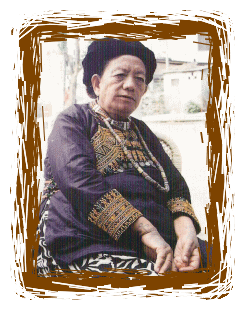 |
 |
Current position:Five Years Glory > Sacrificial Ceremony Staffs |
--- Five Years Glory --- |
| The Origin of Five-Year Fiesta |
| Preparation before Five-Year Fiesta |
| Sacrificial Ceremony Staffs |
| Utensils for the Ceremony |
| Essential Rites of Sacrificial Ceremonies |
| The Process of Five-Year Fiesta |
| Songs |
| Sacrificial Ceremony Staffs |
Sacrificial Ceremony Staffs |
|
Chieftain of the Tribe As a tribal leader in former times, the big chief (Mamazangilan) owns the land and Hunting field in the territory and governs tribal political, economical, military and diplomatic powers. The chieftain has the obligation of tribal safety, expansion, and safeguarding interests of the tribal people. As a natural leader of any tribal ceremony, the chief provides financial, material resources and the site of the ceremony for the “Five-Year Fiesta”, mobilizes the manpower, and also enjoys tariffs of land, Hunting and all honors of the chief. |
|
|
High Priest (Puringau) From the day of birth, spiritual bead (Zako) is bestowed on by ancestors as an identification of spiritual power and status of the high priest. After finishing the required study, a high priest completes the apprenticeship ceremony and thereafter can practice divination to pray and ward off evil spirits and also be a doctor to cure diseases. High priests in Paiwan, categorized by chief high priest (Kalaringan) and high priest (Puringau), are lifetime position for female who would be in charge of sacrificial ceremonies. The duties include officiating and assisting the preparation of formal- and after- ceremonies of “Five-Year Fiesta” such as date divination, Tribe protection, game poles and spiritual balls exorcism. The high priest who has religious power surpassing the chieftain also administer, through different scriptures and instruments, ceremonies of warding off spirits, greeting the spirits, pleasing the spirits, contributing the spirits, and sending off the spirits. |
Priest (Palaingan) Priest is the executor of ceremony in Five-Year Fiesta (in charge of the sacrificial ceremony.) By the criteria of moral characters and physical strength, young healthy and strong males are selected by the high priest using divined spiritual beads. These priest and assistant (Saladj) are to assume duties in Five-Year Fiesta activities and miscellaneous ceremonies. With a term of six years, the position owns special power like a noble class and is extremely respectful in the Tribe. |
|
A Person in Charge of Tossing up the Ball Only a priest can become Roculuq who, after praying for blessings with chanting, tosses up the ball in ball-stabbing games of the Five-Year Fiesta. Except the assistant of the priest, other people can not function in an acting capacity. According to the custom, any ball-stabbing pole in the Five-Year Fiesta should stab at least one ball; otherwise, it is called Marikau, a regret for the warriors, and later would possibly become a motivation for showing more efforts in farming, Hunting, war actions and getting compensation. |
|
Source: Paiwan Tribe - Picture Book of Gulou Village Image: Paiwan Tribe - Picture Book of Gulou Village Edited by: Chiao-yun Chiang, Mei-jun Chen |
|
Planned by volunteer teachers at Kuljaljau Elementary School, Laiyi Township Pingtung County, Year 2007; Made by Goblin’s Aspirational Team.
To view the contents on this website, a computer monitor with 1024x768 dpi and an Internet browser of Microsoft Internet Explorer 5.5 or above is recommended.


